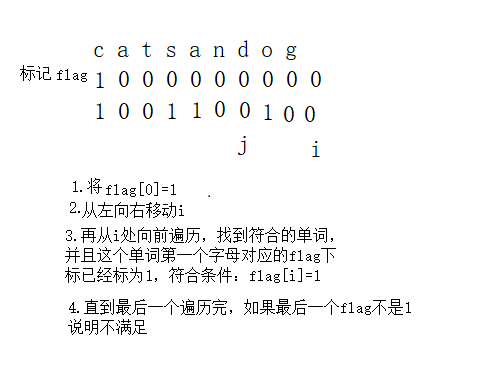Problem description
Given a non-empty string s and a dictionary word Dict containing a list of non-empty words, it is determined whether s can be split into one or more words in the dictionary by spaces.
Explain:
The words in the dictionary can be reused when splitting.
You can assume that there are no repetitive words in the dictionary.
Example 1:
Input: s = leetcode, wordDict = ["leet", "code"]
Output: true
Interpretation: Return true because "leet code" can be split into "leet code".
Example 2:
Input: s = applepenapple, wordDict = ["apple", "pen"]
Output: true
Interpretation: Return true because "apple pen apple" can be split into "apple pen apple".
Note that you can reuse the words in the dictionary.
Example 3:
Input: s = catsandog, wordDict = ["cats", "dog", "sand", "and", "cat"]
Output: false
Solving problems

code implementation
package solution;
import java.util.*;
class Solution {
List<List<String>> lists;
public static void main(String[] args) {
List<String> list=new ArrayList<>();
list.add("cats");
list.add("dog");
list.add("sand");
list.add("and");
list.add("cat");
new Solution().wordBreak("catsandog",list);
}
public boolean wordBreak(String s, List<String> wordDict) {
if (s == null || s.length() == 0) {
return true;
}
Set<String> set = new HashSet<>(wordDict);
int maxLen = getMaxLen(set);
// A word of length n has a total of n + 1 tangent points
boolean[] canSegment = new boolean[s.length() + 1];
canSegment[0] = true;
for (int i = 1; i < canSegment.length; i ++) {
for (int j = 1; j <= maxLen && j <= i; j ++) {
// i - j denotes j positions from i to forward
String str = s.substring(i - j, i);
//If the word qualifies and the first letter of the word corresponds to the canSegment, it is already true.
if (set.contains(str) && canSegment[i - j]) {
canSegment[i] = true;
break;
}
}
}
return canSegment[canSegment.length - 1];
}
private int getMaxLen(Set<String> set) {
int maxLen = 0;
for (String word : set) {
maxLen = Math.max(maxLen, word.length());
}
return maxLen;
}
}
Word splitting 2
Given a non-empty string s and a dictionary word Dict containing a list of non-empty words, add spaces to the string to construct a sentence so that all the words in the sentence are in the dictionary. Return all these possible sentences.
Explain:
The words in the dictionary can be reused when separating.
You can assume that there are no repetitive words in the dictionary.
Example 1:
input: s = "catsanddog" wordDict = ["cat", "cats", "and", "sand", "dog"] //Output: [ "cats and dog", "cat sand dog" ]
Example 2:
Input: s = "pineapplepenapple" wordDict = ["apple", "pen", "applepen", "pine", "pineapple"] Output: [ "pine apple pen apple", "pineapple pen apple", "pine applepen apple" ] Explanation: Note that you can reuse the words in the dictionary.
Example 3:
input: s = "catsandog" wordDict = ["cats", "dog", "sand", "and", "cat"] //Output: []
package solution;
import java.util.ArrayList;
import java.util.List;
public class Solution4 {
public static void main(String[] args) {
String s="catsanddog";
List<String> wordDict = new ArrayList<>();
wordDict.add("cat");
wordDict.add("cats");
wordDict.add("dog");
wordDict.add("sand");
wordDict.add("and");
new Solution4().wordBreak(s,wordDict);
System.out.println(s);
}
private List<String> result;
public List<String> wordBreak(String s, List<String> wordDict) {
if (wordDict.size()<1){
return new ArrayList<>();
}
result=new ArrayList<>();
//Judge first whether it can be split
if(!confirm(s,wordDict)){
return result;
}
//Each traversal of split markup
boolean[] flag=new boolean[s.length()];
//If it can be split
find(s,0,flag,wordDict);
return result;
}
private boolean confirm(String s,List<String> words){
boolean[] flag=new boolean[s.length()+1];
flag[0]=true;
//Find the longest word length in the dictionary
int maxLen=findMax(words);
for(int i=1;i<flag.length;i++){
//To see if the words before i are satisfied, the maximum length of the word is maxLen
for(int j=1;j<=maxLen&&j<=i;j++) {
String str=s.substring(i-j,i);
//The first letter of str corresponds to a mark that is true, and str is in the dictionary.
if(flag[i-j]&&words.contains(str)){
flag[i]=true;
}
}
}
return flag[flag.length-1];
}
private int findMax(List<String> words) {
int max=words.get(0).length();
for(String s:words){
if(max<s.length()){
max=s.length();
}
}
return max;
}
private void find(String s,int index,boolean[] flag,List<String> words){
//After marking up, the segmentation begins.
if(index==s.length()){
StringBuilder sb=new StringBuilder();
int begin=0;//Segmentation starting point
for(int last=0;last<s.length();last++){
if(flag[last]){
sb.append(s.substring(begin,last+1)+" ");
begin=last+1;
}
}
sb.deleteCharAt(sb.length()-1);
result.add(sb.toString());
}
for(int i=index;i<s.length();i++){
//Mark qualified words from index
if(words.contains(s.substring(index,i+1))){
flag[i]=true;
//Satisfies the condition, then marks from i+1
find(s,i+1,flag,words);
//After a round of traversal, all markers are cleared
flag[i]=false;
}
}
}
}